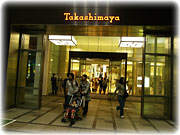
The recession-led slump in retail turnover is being seen as an opportunity by some high-end foreign retailers to tap into the Chinese mainland, but they need to factor in risks associated with market saturation before marching into China, industry analysts told China Daily on Wednesday.
On Tuesday, Takashimaya Co, one of the largest department store operators in Japan, said Shanghai was where it would open its first store in the country.
The 180-year-old Japanese chain store operator will partner with China Enterprise, a Shanghai-listed developer, to launch the eight-storey store in 2012. The project would come up at the Gubei International Fortune Plaza, a commercial property project developed by China Enterprise.
The store, with a floor area of 40,000 sq m, would become one of Shanghai's largest department stores, covering apparel, cosmetics, food and beverages. The store would be a high-end one, targeting the wealthier Shanghai shoppers, Takashimaya said.
Analysts, however, said Shanghai's high-end retail market was already saturated, and pointed out that more such stores would only lead to price wars.
"I don't think such high-end retailers would perform very well in the long run, especially because of the highly competitive market here," said Xu Xiaofang, a retail sector analyst from Guotai & Jun'an Securities.
Shanghai Department Store Association data showed that the city had about 30 foreign department stores, including the Japan-based Isetan and Malaysian retail giant Parkson.
Lu Qilin, deputy director at Uwin Real Estate Research Center, said new stores would not be profitable in the short-term.
Since Shanghai's high-end retail business was located in densely-populated areas such as Huanhai Road and Nanjing Road West, which had gained enough market recognition from shoppers, it would take a while before Gubei can be recognized as a high-end retailing area, he said.
Besides, many Japanese citizens and South Koreans were selling off their houses in Gubei and returning home due to the economic crisis. That means the occupancy rates there were coming down, he said. "Such a situation would pose a threat to Takashimaya's business operations (due to the lack of customers)," Lu said.
Gubei, near the Hongqiao International Airport, has long been regarded as a high-end residential area heavily inhabited by people from Japan, South Korea and Taiwan. It is estimated that around 48,000 Japanese citizens live in Shanghai, with most of them residing in Gubei.
Shanghai's retail consumption volume hit 453.7 billion yuan in 2008, a year-on-year rise of over 15 percent, data from the Shanghai Commerce Commission showed.
(China Daily February 26, 2009)